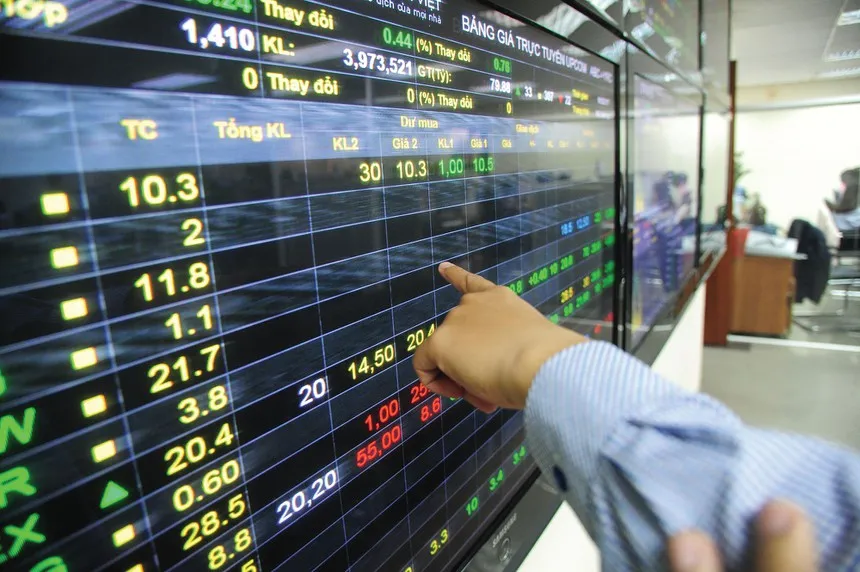
JOURNALIST: - Some argue that the VN Index needs a new wave of retail investors, often referred to as "F0 investors," with substantial capital to stay above 1,300 points. What are your thoughts on this?
Mr. ĐÀO HỒNG DƯƠNG: - I believe market activity is crucial to the stock market's performance. Back in 2021, the VN Index saw its strongest growth, mainly driven by three key sectors: banking, securities, and steel. Investors who held positions in one of these sectors, or spread their investments across multiple sectors, didn’t have many opportunities beyond those industries.
Since then, the VN Index has fluctuated between 1,100 and 1,300 points for an extended period, which actually created ample opportunities for investors to profit and outperform the index. This demonstrates that market dynamism is more important to investors than simply seeing the index surge. However, if the market does break through the 1,300-point threshold, it would serve as a signal for investors to adopt a more optimistic perspective.
Even if the market hovers around 1,300 points, this isn’t necessarily a bad thing—it’s still creating numerous opportunities for investors. Recent data shows that while the VN Index has only risen by about 14% since the beginning of the year, 145 out of 391 stocks listed on Ho Chi Minh City Stock Exchange (HoSE) have outperformed the index. This means that 40% of the stocks have delivered better returns than the index, indicating that opportunities for investors to enter the market are abundant and promising during this period.
- Beyond domestic factors, the continuous selling by foreign investors has been cited as a reason for the VN Index's struggles around the 1,300-point mark. What is your view on this?
- The question of “when will foreign investors return?” is always on the minds of local investors. We’ve witnessed consistent net selling by foreign investors recently. However, when you examine the relationship between the interest rate differential of U.S. and Vietnamese government bonds and foreign selling activity, you can see a correlation.
For example, foreign investors engaged in the most aggressive selling when U.S. Treasury yields peaked at 5%. Now, as the yield spread between U.S. and Vietnamese bonds has narrowed to just 1%, the pace of foreign net selling has significantly decreased. As this interest rate differential shrinks, Vietnam’s stock market is becoming more attractive to foreign investors.
Currently, the gap between average lending rates and 10-year government bond yields has decreased from 7% per year to 6%, and it is expected to continue declining. This indicates a marked improvement in Vietnam's business environment and reflects growing confidence in the country's businesses. This narrowing rate differential is a positive indicator for the attractiveness of Vietnam’s stock market to foreign investors.
- Given these trends, would you say it’s a good time to buy stocks in the market?
- It’s difficult to assert that the market is in an ideal state for buying. However, the market always presents opportunities for investors. If the VN Index breaks above 1,300 points and you haven’t had a chance to buy yet, there could still be better opportunities down the line. I believe investors should stay informed and act according to the market’s developments. Every decision made at the right time can yield positive outcomes.
Looking at the broader picture, the favorable macroeconomic environment, room for monetary policy adjustments, low interest rates, and improved appeal to foreign investors reduce short-term risks for the market. Additionally, the earnings-to-price ratio (E/P) of the VN Index, currently hovering around 7%, is quite attractive compared to 12-month deposit interest rates, making stocks an appealing investment.
- What is your outlook on the banking sector, which holds the largest market capitalization on the Vietnamese stock exchange?
- The banking sector remains a top choice for investors. In terms of market capitalization, the banking sector accounts for more than 60% of the total market cap. When it comes to trading, banks often lead market trends, and it’s difficult to see strong technical chart patterns indicating a bull market unless the banking sector is performing well.
Liquidity-wise, banks contribute between 28% and 42% of the total market’s transaction volume, making them an attractive choice for large institutional investors who prefer sectors with high liquidity. Lastly, banks account for around 52% of the total pre-tax profit of listed companies, which makes the banking sector a critical barometer for the stock market’s overall health.
- Another critical sector is real estate, which is believed to have a significant impact on the stock market. Should investors wait for the real estate market to rebound before entering the stock market?
- Data shows that the real estate and stock markets tend to move in sync, as both are closely linked to macroeconomic factors. Looking at the real estate market’s performance in the first half of 2024, it wasn’t particularly active, with most transactions concentrated in Hanoi and Ho Chi Minh City, particularly in the apartment segment. When it comes to capital flow into real estate, aside from individual savings, we must also consider credit availability.
As of May and June 2024, real estate loans accounted for about 21% of total outstanding loans, with consumer credit almost 1.8 times higher than credit for production and business activities. In 2023, real estate consumer credit saw a decline. Therefore, I expect real estate credit to increase in 2024, driven by two factors: rising demand and low-interest rates.
From my perspective, a recovering real estate market won’t necessarily drain liquidity from the stock market, as both markets can rise in tandem, with each benefiting from favorable monetary conditions.
- Thank you for your insights!




















